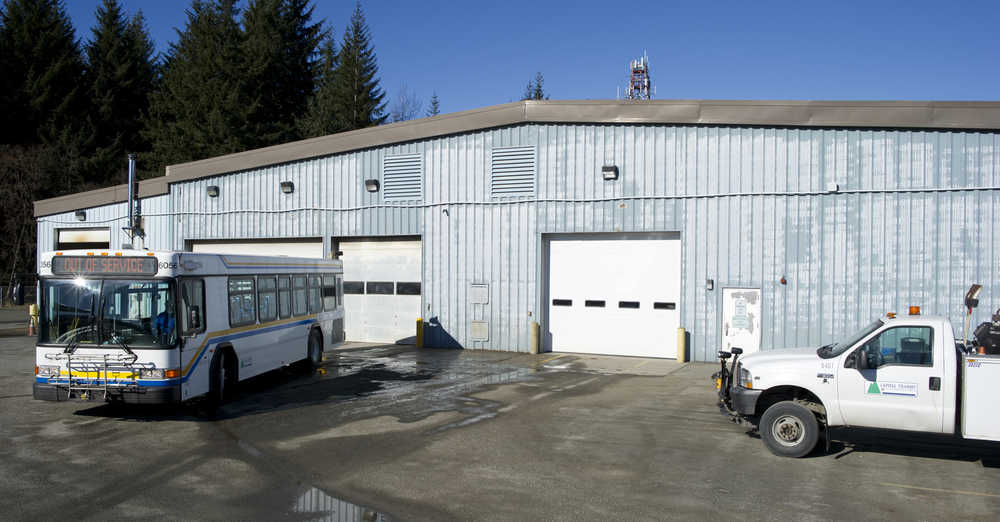Tucked away in the industrial-zoned corner of the Mendenhall Valley just past Brotherhood Bridge is a barn. It doesn’t house horses, cows or chickens. This barn is home to the city’s bus fleet.
The bus barn — formally known as the Capital Transit Facility — is where the city stores, washes and repairs its 18 buses. Now, about 30 years after the city bought the building, the bus maintenance hub is about to receive some much-needed maintenance itself.
“It’s something that’s long overdue and needed,” said Bob Vos, the city’s automotive shop supervisor.
Vos has been working in the bus barn for 26 years. During that time, he and other employees have heard plenty of talk about renovations for the aging facility, but now it seems the rubber is finally about to meet the road.
On Monday, the Assembly approved a $2.75 million dollar loan that will go toward the $4 million renovation of the bus barn, a project that has been in the works since 2012, according to CBJ Streets, Fleet and Transit Superintendent Ed Foster. The project is also being funded by a $500,000 Federal Transit Authority grant. In a previous Empire article published Wednesday, the city manager and city finance director estimated that the overall cost of the project was about $6 million. Their estimates were a little high.
“It’s a pretty big project,” Foster said, and that’s certainly not an understatement. The project will add 4,200 square feet of bus storage to the barn, which is currently only large enough to store 12 of the city’s buses. The remaining six buses sit outside while they’re not in use, and Juneau weather is not kind to vehicles, Foster said. Constant exposure to the elements puts the buses at a greater risk for rust and other mechanical problems.
In addition to the added storage, the renovation project will add a new bus wash station to the bus barn.
That current bus wash station uses drains to catch the water used during each wash. That water is then reused on the next wash, and the cycle continues, Foster said. The problem is that the current washing station is aging and inefficient, like many other aspects of the bus barn. There is no drying system to speak of, which means that each bus leaves the wash wet.
This might not seem like a big deal, but each bus that drives out of the wash currently takes about 35 gallons of water with it. Capital Transit washes all of its buses at least once per day, sometimes more depending on weather, Foster said. All of that water adds up. The bus barn loses at least 630 gallons of water every day. By the end of the year, the wash will have wasted about 230,000 gallons of water. That’s enough water to fill the large lap pool and most of the smaller pool at the August Brown Swimming Pool downtown.
The new wash will include a blow dryer, which should reduce the water waste, Foster said. Instead of 35 gallons, buses will only be removing about 10 gallons of water from the recycle wash system.
Aside from being wasteful, the current wash station is also unable to handle the 11 Care-a-Van buses the city owns. Catholic Community Services operates these smaller buses, which are used to transport seniors who are unable to ride regular buses. The seating section of those buses is wider than the cab where the driver sits, and that causes problems at the washing station. The city stopped putting the Care-a-Vans through the wash after the spinning brushes that wash the sides of the buses damaged the vehicles. That will not happen in the new wash, Foster said.
“You can see how dirty the Care-a-Vans are,” he explained, looking across the bus barn lot where a few buses were parked. “It’ll be nice once we can run them through the wash.”
Dave Sokoloski, a Capital Transit mechanic, started working at the bus barn a little more than 17 years ago, and he’s happy to hear that the long-rumored renovations are finally coming to fruition.
“Hell, I even heard talk of replacing the bus wash back when I started here,” he said. The bus wash isn’t the only thing he’s excited about. The renovations will also include a new bus lift, which is crucial for maintenance.
Currently, the bus barn only has one lift that elevates buses by their frames. There is another portable lift that picks buses up by their wheels, but that lift is only helpful for certain projects.
“Any wheelwork we have to do is on this lift,” Sokoloski said, pointing at the lift he was standing under Thursday while doing annual maintenance work on a bus. Annual maintenance is a normal part of the job for bus barn mechanics, but because it requires wheelwork, it is complicated by the limited number of lifts.
Sokoloski clocked into work Thursday at about 6:30 a.m., and there was already a line to use the frame lift. He had to wait for another bus to be taken off the lift before he could begin his annual maintenance project, which takes two days per bus. Having a lift will relieve the congestion, which often slows maintenance times, according to Sokoloski.
“It’s needed, and it’s nice,” he said about the renovation project. “We’re all looking forward to the change.”
Bidding for construction of the project opens on Wednesday. The bus wash and additional storage bay are scheduled to be complete by the start of October, and the rest of the project should be finished by January 2017, Foster said.
• Contact reporter Sam DeGrave at 523-2279 or sam.degrave@juneauempire.com.

